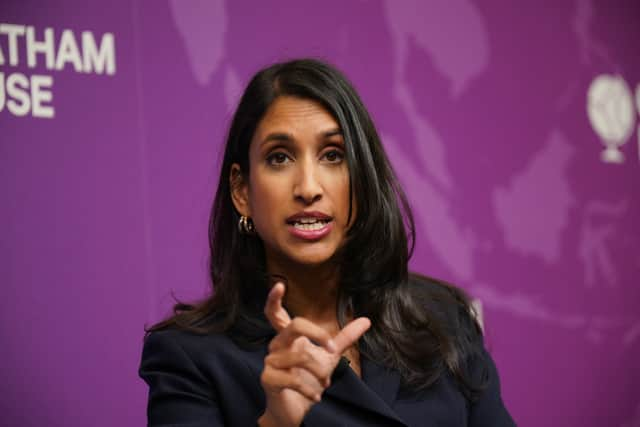Net zero: Government support for new gas power stations 'ignores greener options', climate experts say
and live on Freeview channel 276
The government has committed to support the building of new gas power stations, for days where still or cloudy skies won't do much to power up renewables.
But climate experts warn it might be a step in the wrong direction, which not only ignores greener options, but positions the UK even further back in the race to reach net zero greenhouse gas emissions.
Advertisement
Hide AdAdvertisement
Hide AdAt the Energy Transitions Conference at Central London's Chatham House on Tuesday (12 March), energy security secretary Claire Coutinho was expected to announce the details of her new, "common-sense decision" to shore up the UK’s energy supply, as the nation continued to transition to net zero. In a statement, the Department of Energy Security and Net Zero said the Climate Change Committee itself had recognised the need for "unabated" gas generation into the 2030s as a back-up, to ensure energy security and reduce costs.
"There are no two ways about it. Without gas backing up renewables, we face the genuine prospect of blackouts. Other countries in recent years have been so threatened by supply constraints that they have been forced back to coal," Coutinho was expected to say.


"There are no easy solutions in energy, only trade-offs. If countries are forced to choose between clean energy and keeping citizens safe and warm, believe me they’ll choose to keep the lights on. We will not let ourselves be put in that position. And so, as we continue to move towards clean energy, we must be realistic."
As part of the Energy Secretary's plan to boost gas power capacity, existing laws requiring new gas plants to be built net-zero ready and able to convert to low-carbon alternatives - such as carbon capture - in the future would be broadened. These gas power plants would run less frequently, the government said, as the UK continued to roll out other low carbon technologies.
Advertisement
Hide AdAdvertisement
Hide AdThe announcement comes after the world has just experienced its hottest year on record, with climate experts and activists alike issuing a resounding call for world leaders to radically cut greenhouse gas emissions - especially those from burning fossil fuels - while there is still time to limit warming. Reacting to the new announcement, University of Oxford geosystem sciences professor Myles Allen said that last year, Saudi Arabia announced that no new gas fired power stations would be built without carbon capture and storage, with the first tenders already in progress.
"So, by announcing Britain's new gas plants will only be 'capture ready', when we have some of the best carbon storage capacity in the world and a nascent industry begging for a clear path forward, the government has positioned us behind Saudi Arabia in the race to net zero," he said. "We don't want to be just 'former climate champions' - some of us want the UK to be a future champion as well."
Meanwhile, Dr Iain Staffell, a senior lecturer in sustainable energy for Imperial College London, said this was a "risky move" for the government. "We are only just starting to recover from two years of sky-high energy prices which punished national and household budgets alike, and was largely driven by natural gas. Plans to build more gas-fired power stations will keep us exposed to the geopolitical and economic risks of importing foreign fuels to power our country."
There was also the climate aspect, he continued. "This move locks us into burning more gas over the coming decades, and while it may not substantially increase emissions if they only run infrequently for backup, it is sending the wrong kind of messages to nations that the UK is trying to persuade to follow its climate leadership."
Advertisement
Hide AdAdvertisement
Hide AdWhile he did not believe the UK could completely rely on wind and solar power to supply its electricity - with any misstep risking "a major blackout with far-reaching consequences", he said building more gas power stations was the backwards-looking option.
"There are many tried and tested technologies for bringing more flexibility into our power system: building more links to neighbouring countries... building more energy storage such as batteries, advanced hydro power or green hydrogen, or making the ways we use electricity smarter, such as allowing electric vehicles to charge up when the wind is blowing, and get paid to send power back when it is not. These solutions are all low carbon and improve our energy security, so it is surprising that the government does not place greater emphasis on them," Dr Staffell added.
Environmental campaign groups were also perplexed at the apparent lack of consideration for other options. Rick Parfett, WWF’s senior climate policy advisor said that the UK's dependence on polluting fossil fuels like gas was what had caused energy bills to soar. "To slash bills, we need to build renewables, insulate homes, and deploy heat pumps more quickly. Using homegrown clean hydrogen and batteries is the way to keep the lights on, not importing expensive, polluting gas."
He continued: "The government must legislate to ensure that any new plants can easily convert to hydrogen and only run for a very limited number of hours until this has happened. To meet the UK’s net zero target we need a clear plan for phasing out unabated gas."
Advertisement
Hide AdAdvertisement
Hide AdAmber Allott is NationalWorld’s environment and sustainability specialist, covering all things green - from climate to conservation. If you liked this article you can follow Amber on X (Twitter) here and sign up for the free daily NationalWorld Today newsletter here - with Amber bringing you the UK's most important, pressing, weird and wonderful environmental stories every Tuesday.
Comment Guidelines
National World encourages reader discussion on our stories. User feedback, insights and back-and-forth exchanges add a rich layer of context to reporting. Please review our Community Guidelines before commenting.
